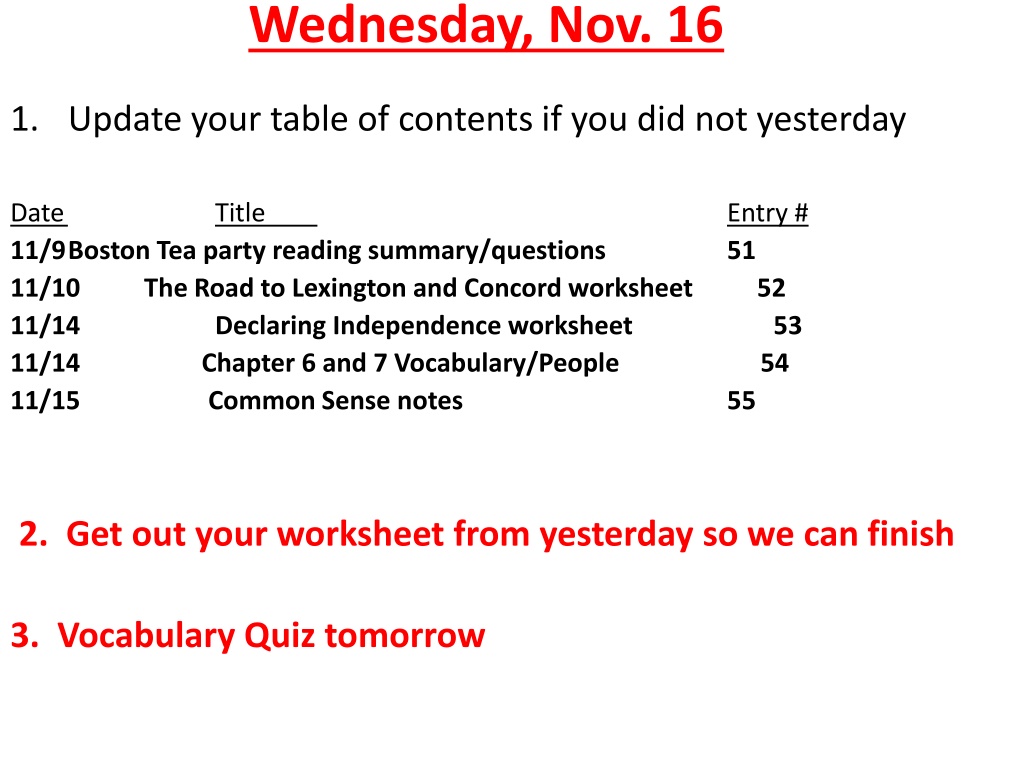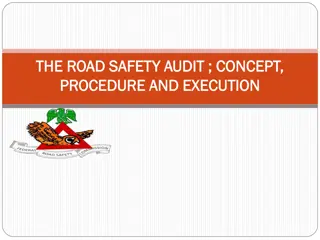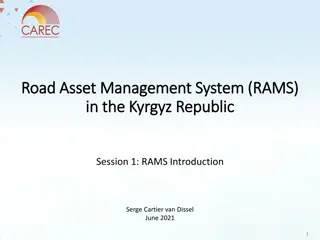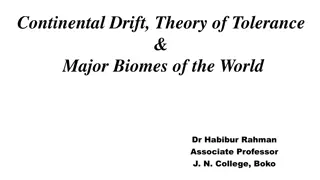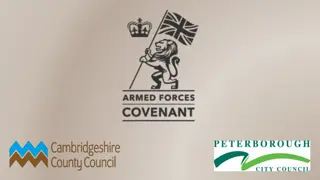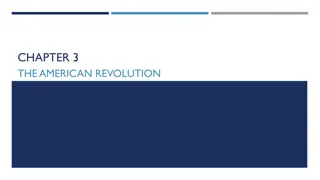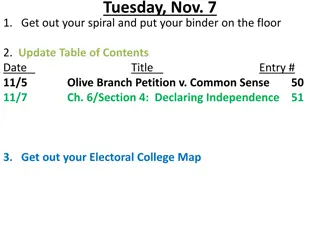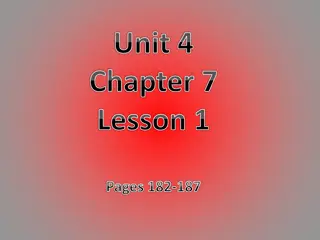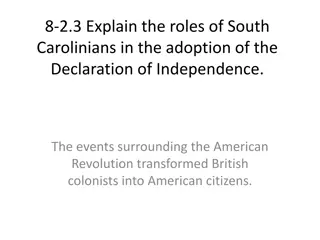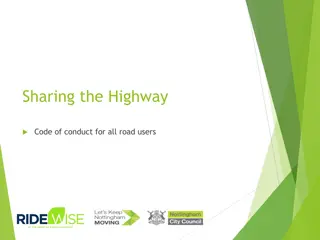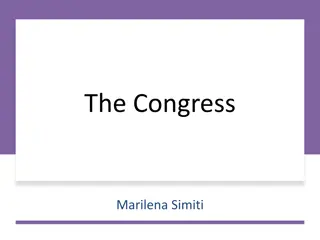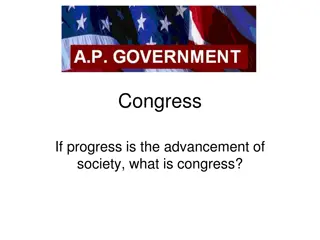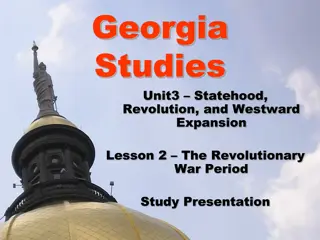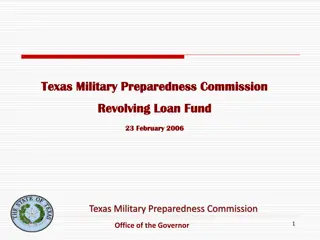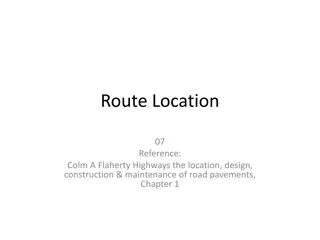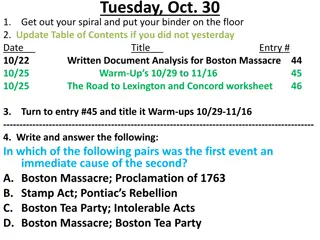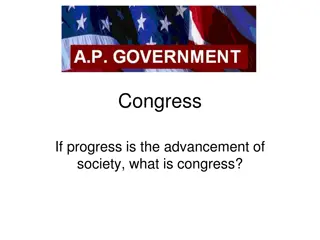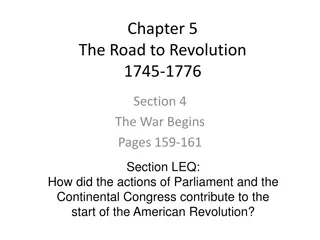The Road to Independence: Second Continental Congress and Military Actions Overview
The chapter delves into the pivotal events following the Second Continental Congress, including the drafting of the Olive Branch Petition, the American attack on Fort Ticonderoga, and the significant Battle of Bunker Hill. Despite British victory, this battle marked a moral triumph for the American cause.
Download Presentation

Please find below an Image/Link to download the presentation.
The content on the website is provided AS IS for your information and personal use only. It may not be sold, licensed, or shared on other websites without obtaining consent from the author. Download presentation by click this link. If you encounter any issues during the download, it is possible that the publisher has removed the file from their server.
E N D
Presentation Transcript
Wednesday, Nov. 16 1. Update your table of contents if you did not yesterday Date 11/9Boston Tea party reading summary/questions 11/10 The Road to Lexington and Concord worksheet 52 11/14 Declaring Independence worksheet 53 11/14 Chapter 6 and 7 Vocabulary/People 54 11/15 Common Sense notes Title Entry # 51 55 2. Get out your worksheet from yesterday so we can finish 3. Vocabulary Quiz tomorrow
Chapter 6/Section 4: Declaring Independence A. Categorizing Political Actions Outcomes 1. Second Continental Congress meets (May 1775) Chose George Washington as military commander Authorized printing of paper money
Chapter 6/Section 4: Declaring Independence A. Categorizing Political Actions Outcomes 1. Second Continental Congress meets (May 1775) 2. Congress drafts the Olive Branch Petition (July 1775) Military Actions Outcomes 3. Americans attack Fort Ticonderoga (May 1775) Americans captured the fort and its cannons and large guns
Chapter 6/Section 4: Declaring Independence A. Categorizing Political Actions Outcomes 1. Second Continental Congress meets (May 1775) 2. Congress drafts the Olive Branch Petition (July 1775) King George rejected the petition (blockaded entire colonies, sent German mercenaries called Hessians)
Battle of Bunker Hill http://www.youtube.com/watch?v=yaAIk6ydRwg
Chapter 6/Section 4: Declaring Independence A. Categorizing Political Actions Outcomes 1. Second Continental Congress meets (May 1775) 2. Congress drafts the Olive Branch Petition (July 1775) Military Actions Outcomes 3. Americans attack Fort Ticonderoga (May 1775) 4. Continental Army fights in the Battle of Bunker Hill (June 1775) British won but suffered huge causalities. Moral victory for the Americans
Chapter 6/Section 4: Declaring Independence A. Categorizing Political Actions Outcomes 1. Second Continental Congress meets (May 1775) 2. Congress drafts the Olive Branch Petition (July 1775) Military Actions Outcomes 3. Americans attack Fort Ticonderoga (May 1775) 4. Continental Army fights in the Battle of Bunker Hill (June 1775) 5. Continental Army invades Quebec (Nov. 1775) Continental Army was defeated
Chapter 6/Section 4: Declaring Independence A. Categorizing Political Actions Outcomes 1. Second Continental Congress meets (May 1775) 2. Congress drafts the Olive Branch Petition (July 1775) Military Actions Outcomes 3. Americans attack Fort Ticonderoga (May 1775) 4. Continental Army fights in the Battle of Bunker Hill (June 1775) 5. Continental Army invades Quebec (Nov. 1775) 6. Continental Army surrounds British forces in Boston (Jan. 1776) Continental Army s show of strength causes British soldiers and Loyalists to leave Boston
Entry 55 Who: *Thomas Paine was an immigrant from England. *He was asked to write an essay urging independence Common Sense
Entry 56 Who: *Thomas Paine was an immigrant from England. *He was asked to write an essay urging independence Common Sense When: *Common Sense was written in Jan. 1776
Entry 56 Why: * Parliament didn t have the right to make laws for the colonies. *Kings are corrupt *Economically, we could survive w/out England Who: *Thomas Paine was an immigrant from England. *He was asked to write an essay urging independence Common Sense When: *Common Sense was written in Jan. 1776
Entry 56 Why: * Parliament didn t have the right to make laws for the colonies. *Kings are corrupt *Economically, we could survive w/out England Who: *Thomas Paine was an immigrant from England. *He was asked to write an essay urging independence Common Sense When: *Common Sense was written in Jan. 1776 Significance: This pamphlet sold many colonists on the idea of independence.
Chapter 6 and 7 Voc/People Quiz tomorrow People: Chapter 6 1. 160 2. 162 3. 164 4. 163 Chapter 7 1. 2. 3. 4. 5. 6. 178 185 189 191 199 199
